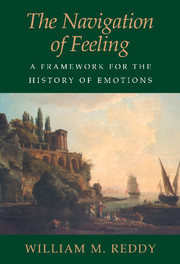Book contents
- Frontmatter
- Contents
- Preface
- Part I What are Emotions?
- Part II Emotions in History: France, 1700–1850
- 5 The Flowering of Sentimentalism (1700–1789)
- 6 Sentimentalism in the Making of the French Revolution (1789–1815)
- 7 Liberal Reason, Romantic Passions (1815–1848)
- 8 Personal Destinies: Case Material of the Early Nineteenth Century
- Conclusion
- Appendix A Detailed Review of Anomalous Cases from the Gazette des Tribunaux Sample
- Appendix B Detailed Review of Anomalous Cases from the Tribunal Civil de Versailles Sample
- References
- Index
7 - Liberal Reason, Romantic Passions (1815–1848)
Published online by Cambridge University Press: 07 September 2009
- Frontmatter
- Contents
- Preface
- Part I What are Emotions?
- Part II Emotions in History: France, 1700–1850
- 5 The Flowering of Sentimentalism (1700–1789)
- 6 Sentimentalism in the Making of the French Revolution (1789–1815)
- 7 Liberal Reason, Romantic Passions (1815–1848)
- 8 Personal Destinies: Case Material of the Early Nineteenth Century
- Conclusion
- Appendix A Detailed Review of Anomalous Cases from the Gazette des Tribunaux Sample
- Appendix B Detailed Review of Anomalous Cases from the Tribunal Civil de Versailles Sample
- References
- Index
Summary
In July 1816, two Parisian notables came to Maine de Biran's door. M de Castel Bajac and the duchesse de Rohan, both friends of his, asked him for the traditional contribution for the poor in honor of Saint Sauveur. In response he offered them six francs,
believing that this would be the average amount offered by the well-off sort. But the duchess told me of persons who had given twenty or forty francs. Her words upset me, and I experienced at once an agitation of the mind and a regret as sharp as if I had committed the most malign and most dishonorable of actions.
Maine de Biran was struck dumb with chagrin, and the duchesse and her escort left without further conversation. Afterward, he rehearsed the situation obsessively.
From that moment, I could not think of anything else: What would the Duchess of Rohan think of me? What of my colleague [M de Castel Bajac] who held only the most benevolent feelings for her? … Wouldn't I become the laughing-stock of that whole group? Wouldn't they view a contribution so out of proportion with my position, as shabby, selfish, and this single gesture would it not reveal a character that was narrow and small-minded? (Maine de Biran 1954–1957:I, 186–187)
He attempted to dislodge the episode from his mind with the distraction of a ride on his horse, to no avail. He walked to the duchesse's house, thinking to add more to his contribution, but feared making another blunder.
- Type
- Chapter
- Information
- The Navigation of FeelingA Framework for the History of Emotions, pp. 211 - 256Publisher: Cambridge University PressPrint publication year: 2001

